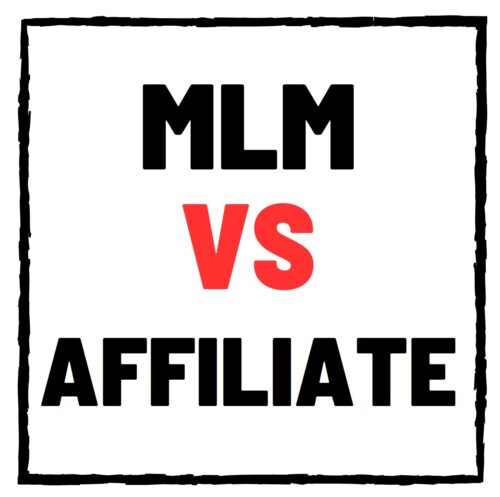
Network marketing (MLM) vs Affiliate marketing in 2024
- MLM
- March 25, 2024
Network marketing VS Affiliate Marketing!
Does the world of marketing feel like a labyrinth, where every turn introduces a new complexity?
Do you find yourself on a perpetual quest to find the best strategy to boost your earnings and accomplish your objectives?
Don’t worry, you’re not the only one.
The conundrum between affiliate marketing and network marketing (also known as MLM) confronts many individuals, making them question which marketing path to traverse.
This article is your compass, guiding you through the enigma of these two prevalent marketing approaches.
Whether you’re an experienced entrepreneur or a novice, the insights contained here can help you chart a course to success.
Dive in to discover more.
Wait before I do:
Do you want to know a 100% legit way to make an income from home?
What if you could build a passive income stream that’s actually passive?
An income stream that doesn’t require:
- Inventory
- Selling to friends and family
- Selling to strangers
- Recruiting people
- Dealing with questionable products that weigh on your conscience
An income stream that brings in consistent revenues every single month (from a couple thousand dollars to well over $10,000)?
An income stream you could actually build in your spare time, and grow as large or as small as you want to, without having to spend hours a day chasing, selling, or managing anything?
If that sounds like something you’d be interested in, check out Digital Real Estate.
Okay now continue to read to find out the differences between network marketing vs affiliate marketing.
Decoding Network Marketing
What is network marketing?
Network marketing, frequently referred to as multi-level marketing (MLM), is a unique business construct where a company’s products are sold directly to the consumer through a lattice of independent salespeople, often called distributors. Distributors earn not only from the products they sell, but also from the sales made by those they’ve brought into the network. In essence, network marketing is a conduit for companies to broaden their consumer base while providing individuals with an opportunity to generate income by marketing products and recruiting others to do the same.
What makes network marketing appealing?
Network marketing offers a plethora of potential benefits:
- It empowers individuals to earn by selling products and inducting others into the network.
- It allows companies to penetrate deeper into the market by selling their products directly to consumers.
- It provides an opportunity to launch your own business with a relatively low initial investment.
- It offers flexibility in work hours and fosters an entrepreneurial spirit.
- It presents avenues for personal development and growth.
What are the potential pitfalls of network marketing?
While network marketing, or MLM, can be a legitimate pathway to generate income, it isn’t without its challenges. Some common stumbling blocks include:
- Profits can be elusive, with the lion’s share of income often derived from recruitment rather than product sales.
- Finding customers outside of the network can be a tough task, hampering product sales.
- Some network marketing companies have faced accusations of being pyramid schemes, with an overemphasis on recruitment rather than product sales.
- The products offered are often priced high, reducing competitiveness with traditional retailers.
- The promises of income potential can be overstated, and many people end up making a loss rather than a profit.
Before delving into network marketing, it’s crucial to conduct meticulous research and critically assess the potential risks and rewards.
Unveiling Examples of Network Marketing Companies
Here are five instances of companies that harness the power of network marketing:
These companies employ the MLM model to market their products or services. Distributors earn a commission on their sales and have the opportunity to grow their earnings by building their distributor teams. This network of salespeople collaboratively helps the company penetrate broader markets and provides distributors with additional income potential.
The Pyramid Scheme Explained
A pyramid scheme is an investment scam where recruits are lured with the promise of earning money predominantly through the addition of new members rather than the sale of a legitimate product or service. The system necessitates a continuous inflow of new members to maintain profits. The unsustainable nature of these schemes often results in the majority of participants losing money.
Is network marketing (multi-level marketing) synonymous with a pyramid scheme?
While MLM can resemble a pyramid scheme due to its emphasis on recruitment, it’s important to differentiate the two. In a pyramid scheme, money is primarily made through recruiting, not by selling a genuine product or service. MLM, on the other hand, does involve the sale of a product or service, despite its heavy reliance on recruitment.
Is affiliate marketing a pyramid scheme?
Affiliate marketing, contrary to pyramid schemes, does not primarily rely on recruitment for income. In affiliate marketing, individuals market products or services on a company’s behalf and earn a commission for each sale or referral they make. This approach focuses on the sale of products or services, not on the inflow of new members.
Affiliate Marketing vs. Network Marketing: The Distinction
The principal disparities between MLM and affiliate marketing lie in the sales methodology and the income opportunities for the marketer.
In MLM, a network of distributors makes sales, with each distributor earning a commission from their own sales and those of the recruits under them. This forms a pyramid-like structure, where a distributor at the top earns from the sales made by distributors beneath them.
Affiliate marketing, in contrast, is executed by individuals who are not part of a formal sales network. These individuals, referred to as affiliates, generate their income through their own marketing endeavors, such as through a blog or social media account. In contrast to MLM, affiliate marketing lacks a pyramid structure, and affiliates earn solely from their own sales.
Thus, the primary distinction between MLM and affiliate marketing lies in the sales structure and the income possibilities for the marketer. MLM employs a hierarchical structure with the potential for commissions from recruits’ sales, while affiliate marketing lacks this hierarchy, with affiliates earning solely from their own sales.
Affiliate Marketing or Network Marketing: Which Is Superior?
The supremacy of affiliate marketing over network marketing (or vice versa) is subjective, as both approaches offer unique advantages and disadvantages.
Affiliate marketing often requires a lower startup cost, with no need for a starter kit or inventory. Moreover, affiliates have the liberty to endorse products or services of their choice, providing the opportunity to specialize in a niche, potentially earning a higher commission from sales.
Network marketing, however, offers the potential for residual income from the sales of other distributors in the network. It also often includes training and support from the company, which can be invaluable to those new to the sales or marketing field.
Your choice between affiliate marketing and network marketing will hinge on your goals, experience, and preferences. Both options merit consideration, and a careful examination of the pros and cons is advisable before making a decision.
In Summary
In essence, both affiliate marketing and network marketing are viable pathways to income generation. Affiliate marketing affords flexibility to promote a variety of products and the potential for higher sales commissions, while network marketing opens doors to residual income and the backing of a sales team. The decision to choose one over the other will be influenced by an individual’s objectives, experience, and preferences. Deliberate consideration of both options and a detailed assessment of the pros and cons will help steer you towards the most suitable choice.
My Number 1 Recommendation
Do you want to know a 100% legit way to make an income from home?
What if you could build a passive income stream that’s actually passive?
An income stream that doesn’t require:
- Inventory
- Selling to friends and family
- Selling to strangers
- Recruiting people
- Dealing with questionable products that weigh on your conscience
An income stream that brings in consistent revenues every single month (from a couple thousand dollars to well over $10,000)?
Take a look at some of the results:



An income stream you could actually build in your spare time, and grow as large or as small as you want to, without having to spend hours a day chasing, selling, or managing anything?
If that sounds like something you’d be interested in, check out Digital Real Estate.
Follow me on Social media below:
Subscribe To My YouTube Channel Here.
See you at the top,

-Jesse Singh
P.S. If you are tired of failing ANY business, click here and check this out to take your game to the next level.
